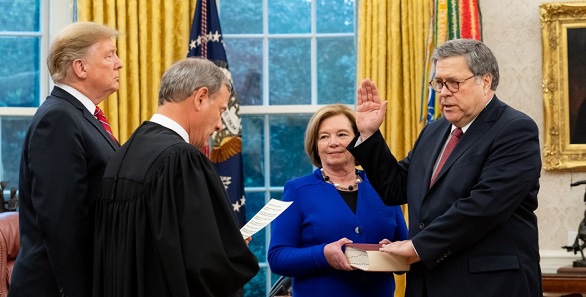AG Barr controls Mueller’s investigation
March 24, 2019 | Expert Insights

Special Counsel Mueller’s investigation concludes after handing over final report to Attorney General Barr, who controls the outcome of the inquiry.
Background
United States’ intelligence agencies believe that Russia had interfered in the 2016 presidential elections. On May 17, 2017, the Department of Justice (DoJ) appointed Robert Mueller a special counsel to oversee the investigation into Russian interference and related matters. Mr. Mueller is a former Director of the FBI, serving from 2001 to 2013. Since his appointment, Mr. Mueller has kept a low profile in the media and has assembled a team of top lawyers and investigators.
Mr. Muller’s investigation includes possible links or coordination between Donald Trump's presidential campaign and the Russian government. The Special Counsel Investigation was referred to as the Mueller Probe or the Mueller Investigation and includes in its scope any potential obstruction of justice by President Trump and others.
Some of the key players within the Trump campaign who have been examined are – Paul Manafort, the former Chairman of the Trump Presidential campaign, Donald Trump Jr. , Jared Kushner, Senior Advisor to the White House, General Flynn, former National Security Advisor, longtime political operative Roger Stone, and Michael Cohen, President Trump’s former personal lawyer. Mr. Cohen and Mr. Manafort have already received sentences as a result of the investigation.
Analysis
On March 22, 2019, Special Counsel Robert Mueller concluded his 22-month inquiry into Russia’s role in the 2016 elections by handing over a confidential report to Attorney General William Barr. Justice Department regulations permit AG Barr to determine if the report should be publicly disclosed and if so, how much is to be released. A Democrat-sponsored resolution in the House passed 420-0, called for the final report to be made public, in a symbolic act intended to pressure AG Barr to release as much information as possible. A similar resolution is unlikely to pass the Senate. Despite this, lawmakers across the aisle urged the quick release of the report, with Democrats threatening subpoenas if any information was to be withheld. AG Barr insisted in a statement addressed to lawmakers, “I remain committed to as much transparency as possible, and I will keep you informed as to the status of my review.” Some analysts believe that the “comprehensive” report will be released as early as March 23.
The major question yet to be answered is whether the report outlines wrongdoing by President Trump or his campaign. In a major clue to discerning the contents of the report, a senior Justice Department official said that Mr. Mueller did not recommend further indictments, indicating no more criminal charges are to be brought forth. Mr. Mueller’s investigations have so far yielded charges against 34 individuals and three companies, with prison sentences for some of Trump’s former aides. Still, it is unlikely that any charges are to be levied against the incumbent president; the Justice Department currently holds to a policy that states that sitting presidents cannot face criminal charges. In the meantime, multiple House committees are actively probing the actions of the Trump campaign and of the president himself.
The key variable in the release of the report is AG Barr. AG Barr was appointed to his post following the dismissal of previous AG, Jeff Sessions, who had incurred President Trump’s anger over his failure to dismiss Mr. Mueller’s investigations. AG Barr and Mr. Mueller are known to have been friends and are likely to agree with Mr. Mueller’s assessments of the findings. Still, the incumbent AG is a member of President Trump’s Republican Party and may find it within his partisan interests to suppress critical information.
Should the contents of the report released to the public be unsatisfactory to Democrats, and subpoenas issued, the whole report may still never see the light of day. President Trump, as the head of the executive branch of government, could instruct the Justice Department to ignore the subpoena. If the course of future events remains true to this, it may set the stage for a court battle that may reach the Supreme Court. The Supreme Court, in turn, has recently seen the appointment of multiple judges by President Trump, in moves that establish a conservative skew within the top judiciary.
Assessment
Our assessment is that it is unlikely that further indictments appear from Special Counsel Mueller’s final report. However, we believe that the key to the final outcome of the investigations ultimately lies in Attorney General Bar’s hands. We believe that AG Barr will remain true to the responsibilities of his job, although certain issues adjudicated by him as irrelevant may set the stage for a bitter court battle that may reach the conservatively-skewed Supreme Court.








Comments